
Khyber Pakhtunkhwa, formerly known as North West Frontier Province (NWFP), is a province of Pakistan. Located in the northwestern region of the country, Khyber Pakhtunkhwa is the fourth largest province of Pakistan by land area and the third-largest province by population. It is bordered by the Pakistani provinces of Balochistan to the south, Punjab to the south-east, the territory of Gilgit-Baltistan to the north and north-east, Islamabad Capital Territory to the east and Azad Kashmir to the north-east. It shares an international border with Afghanistan to the west. Khyber Pakhtunkhwa has a varied landscape ranging from rugged mountain ranges, valleys, plains surrounded by hills, undulating submontane areas and dense agricultural farms.

The administrative units of Pakistan comprise four provinces, one federal territory, and two disputed territories: the provinces of Punjab, Sindh, Khyber Pakhtunkhwa, and Balochistan; the Islamabad Capital Territory; and the administrative territories of Azad Jammu and Kashmir and Gilgit–Baltistan. As part of the Kashmir conflict with neighbouring India, Pakistan has also claimed sovereignty over the Indian-controlled territories of Jammu and Kashmir and Ladakh since the First Kashmir War of 1947–1948, but has never exercised administrative authority over either region. All of Pakistan's provinces and territories are subdivided into divisions, which are further subdivided into districts, and then tehsils, which are again further subdivided into union councils.
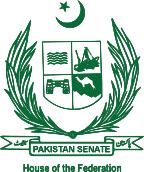
The Senate of Pakistan or Aiwān-e-Bālā Pākistān, constitutionally the House of the Federation, is the upper house of the bicameral Parliament of Pakistan. As of 2023, It has a maximum membership of 96, of which 92 are elected by the provincial legislatures using single transferable vote. Four represent the Federal Capital. Members sit for terms lasting six years, with half of the house up for election every three years. Unlike the National Assembly, the Senate is a continuing chamber and hence not subject to dissolution.

The Provincially Administered Tribal Area (PATA) was the former administrative subdivision of Pakistan designated in the Article 246(b) of the Constitution of Pakistan. No Act of Provincial Assembly can be applied to PATA whereas the Governor of the respective province has a mandate parallel to the authority President of Pakistan has over Federally Administered Tribal Areas. In 2018, a Twenty-fifth Amendment to the Constitution of Pakistan merged PATA, as well as FATA into full control of the Khyber-Paktunkhwa government, thus the PATA designation has no legal standing in the future of Khyber-Paktunkhwa.

The Frontier Crimes Regulations (FCR) were a special set of laws of British India, and which were applicable to the Tribal Areas. They were enacted by the British Empire in the nineteenth century and remained in effect in Pakistan until 2018. They were extended to the Gilgit Agency in Jammu and Kashmir in 1901 and to Baltistan in 1947, remaining in effect till the 1970s.

Dera Ismail Khan Division is an administrative division of Khyber Pakhtunkhwa Province, Pakistan. It is the southernmost division of Khyber Pakhtunkhwa. CNIC code of Dera Ismail Khan Division is 12.
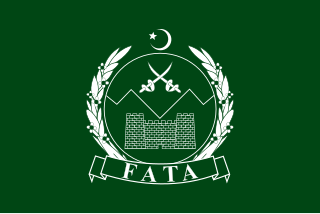
The Federally Administered Tribal Areas, commonly known as FATA, was a semi-autonomous tribal region in north-western Pakistan that existed from 1947 until being merged with the neighbouring province of Khyber Pakhtunkhwa in 2018 through the Twenty-fifth amendment to the constitution of Pakistan. It consisted of seven tribal agencies (districts) and six frontier regions, and were directly governed by the federal government through a special set of laws called the Frontier Crimes Regulations.
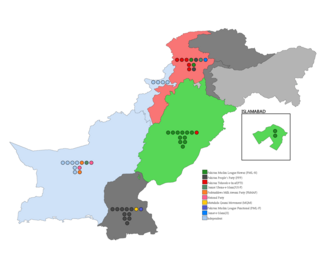
The triennial Senate Electionsof Pakistan were held on 3 March 2018 to replace 52 retiring senators - half of the Senate's strength - with the winning candidates serving six-year terms. Overall, Pakistan Muslim League (N) came out as the largest party, followed by the Pakistan Peoples Party and the Pakistan Tehreek-e-Insaf. The results of these elections were steeped in controversy due to rampant allegations of horse trading and vote-buying, which lead to the Prime Minister and opposition leader Imran Khan calling for reforms. Prior to this election, PML (N) candidates were declared as independents by the Election Commission of Pakistan owing to a Supreme Court judgment.
Administrative System of FATA was the system by which semi-autonomous tribal region of Federally Administered Tribal Areas was governed.
Events in the year 2018 in Pakistan.

Mamund Tehsil is an administrative subdivision (tehsil) of Bajaur District in Khyber Pakhtunkhwa Province, Pakistan. Mamund is the largest of Bajaur District's seven tehsils.

Bar Chamarkand Tehsil, alternatively written Bar Chamar Kand is an administrative subdivision (tehsil) of Bajaur District in Khyber Pakhtunkhwa Province, Pakistan. Bar Chamarkand is the smallest of Bajaur District's seven tehsils.
The FATA Interim Governance Regulation, 2018 was a law signed by the President of Pakistan on May 28, 2018, which replaces the Frontier Crimes Regulations (FCR) and outline how the Federally Administered Tribal Areas will be governed "within a timeframe of two years" as the region is merged with Khyber Pakhtunkhwa through the passage of the Thirty-first Amendment to the Constitution of Pakistan. An official described the regulation as a combination of the FCR and the rejected Tribal Areas Rewaj Act.

Provincial elections were held in the Pakistani province of Khyber Pakhtunkhwa's constituencies belonging to areas previously known as the Federally Administered Tribal Areas (FATA) on 20 July 2019. After the election, the new members joined the already elected members from the rest of the province to complete the formation of 11th Provincial Assembly of Khyber Pakhtunkhwa.
On 31 May 2018, with the application of 25th Amendment, Federally Administrated Tribal Areas ceased to exist, and stood merged into neighbouring province of Khyber Pakhtunkhwa.
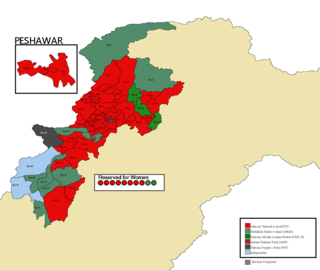
General elections were held in Khyber Pakhtunkhwa on Wednesday, 25 July 2018 to elect the 51 members of 15th National Assembly from Khyber Pakhtunkhwa. The Pakistan Tehreek-e-Insaf (PTI) obtained a landslide victory in the province by winning 37 general seats and increased their margin of victory from 2013. The PTI also won 8 out of 10 reserved seats while the Pakistan Muslim League (N) (PML-N) and Muttahida Majlis-e-Amal (MMA) won 1 reserved seat each.

PK-67 Mohmand-I is a constituency for the Khyber Pakhtunkhwa Assembly of the Khyber Pakhtunkhwa province of Pakistan.It was created in 2018 after merger of FATA with Khyber Pakhtunkhwa before 2019 elections.

PK-68 Mohmand-II is a constituency for the Khyber Pakhtunkhwa Assembly of the Khyber Pakhtunkhwa province of Pakistan.It was created in 2018 after merger of FATA with Khyber Pakhtunkhwa before 2019 elections.
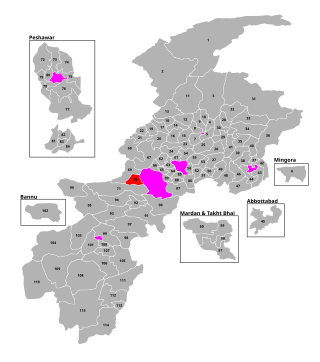
PK-70 Khyber-II is a constituency for the Khyber Pakhtunkhwa Assembly of the Khyber Pakhtunkhwa province of Pakistan.It was created in 2018 after merger of FATA with Khyber Pakhtunkhwa before 2019 elections.


















